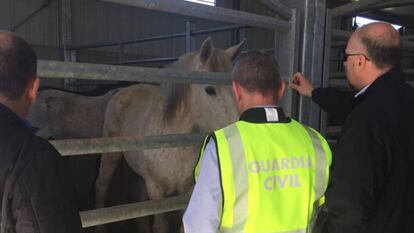Dozens arrested in Spanish-led raid against horsemeat racket
Civil Guard and Europol break up a ring led by Spain-based Dutchman who made €20 million in profits


The Spanish Civil Guard, in coordination with Europol, has dismantled a pan-European horsemeat racket led by a Dutchman based in Spain who exported meat unfit for human consumption, mostly to Belgium and Italy. Operation Gazel began a year ago and has already resulted in 65 arrests in Spain, including slaughterhouse owners, vets and breeders.
Authorities from France, Portugal, Belgium, Italy, Romania, Switzerland, Netherlands and Britain participated in the raid.
A Dutch national named Jan Fasen is allegedly behind a network whose profits are estimated at €20 million, according to the Civil Guard. Several bank accounts have been blocked and property confiscated as part of the investigation. Law enforcement officers also seized five new luxury vehicles.
Nine of the detainees, including Fasen, remain in custody after a court in the northern Spanish city of Ponferrada put them in preventive custody. Fasen was arrested in Belgium in April, during a trip he took there, then transferred to Spain.
The horses were obtained in northern Spain and Portugal, and some of them may have been stolen
Horses raised for meat must undergo stringent health checks. The criminal ring was allegedly selling meat products obtained from animals used for recreation, which are not put through these controls.
The individuals under arrest and being investigated face charges that include animal abuse, document forgery, money laundering and criminal association.
There are also charges of crimes against public health, because analyzed samples turned up traces of antibiotics that are not allowed in meat meant for human consumption, said sources familiar with the investigation.
Health hazards
Early analyses of meat samples found traces of antibiotics, which horses raised for meat are not treated with. The same sources said that they are awaiting new reports from the Spanish Consumption, Food Safety and Nutrition Agency.
Horses used for recreational purposes are fitted with microchips that contain information about each animal. During the raid, Spanish officers found a stable in the northern region of Cantabria where the chips were being extracted from animals’ necks with a knife cut. The property owners are being charged with animal abuse.
The man at the center of the ring, Jan Fasen, was living in the Spanish Mediterranean town of Calpe (Alicante). In a Sunday press release, Europol noted that this same individual was involved in a case of adulterated beef burgers in Ireland in 2013. Those products were found to contain horsemeat.
The latest operation began in June of last year, when the Civil Guard Environmental Protection Service (Seprona) located Fasen in Calpe, from where he “was handling the entire network from the shadows, placing trusted individuals in charge in all the territories where the ring had a presence.”
Fasen even hired a businessman, Ramón Cerdá, who specializes in setting up companies – some of which have turned up in police investigations into some of Spain’s biggest corruption scandals, such as Gürtel and Nóos.
The horses were obtained in northern Spain and Portugal. Investigators suspect that some of them may have been stolen. Three slaughterhouses in Astorga, Toreno and Segovia were charged with putting them down. The animals’ documents were forged so they could be passed off as fit for human consumption.
Investigators underscore that the arrested vets – some of whom worked independently while others were on the payroll of the regional government of Castilla y León – should have checked the horses’ origins.
After being slaughtered, the animals were trucked to a facility in Toledo for processing, said the same sources. Although some of the products were sold in Spain, most were being exported to Italy and Belgium, considered one of the biggest horsemeat exporters in the European Union, according to the Europol press release.
English version by Susana Urra.
Tu suscripción se está usando en otro dispositivo
¿Quieres añadir otro usuario a tu suscripción?
Si continúas leyendo en este dispositivo, no se podrá leer en el otro.
FlechaTu suscripción se está usando en otro dispositivo y solo puedes acceder a EL PAÍS desde un dispositivo a la vez.
Si quieres compartir tu cuenta, cambia tu suscripción a la modalidad Premium, así podrás añadir otro usuario. Cada uno accederá con su propia cuenta de email, lo que os permitirá personalizar vuestra experiencia en EL PAÍS.
¿Tienes una suscripción de empresa? Accede aquí para contratar más cuentas.
En el caso de no saber quién está usando tu cuenta, te recomendamos cambiar tu contraseña aquí.
Si decides continuar compartiendo tu cuenta, este mensaje se mostrará en tu dispositivo y en el de la otra persona que está usando tu cuenta de forma indefinida, afectando a tu experiencia de lectura. Puedes consultar aquí los términos y condiciones de la suscripción digital.








































